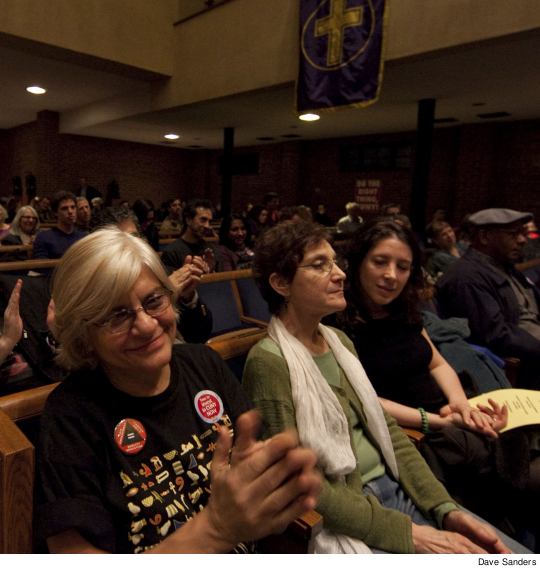 |
Nearly 350 faculty, staff and students attended the PSC’s Town Hall Meeting on Pathways, CUNY’s top-down overhaul of general education and transfer. After opening presentations, about 30 people spoke during an hour-long open mic, criticizing Pathways and demanding an alternative.
“The claims of Pathways are false, the method of its imposition on us is a direct attack on faculty governance and its effect on students will be disastrous,” said PSC President Barbara Bowen. Pathways “is an austerity education, preparing our students for low expectations,” said Bowen – and students as well as faculty and staff find that unacceptable.
NOT JUST A REPEAL
“We are not powerless. That’s why we have a union, that’s why we’re here together,” Bowen said to loud applause. “We do not have to say, ‘Okay, we hate it, but it’s done.’…This is a fight we can win.”
The union’s campaign for an alternative to Pathways includes a petition drive, a lawsuit and a possible protest at an April 30 meeting of the Board of Trustees. “If we haven’t seen any movement from CUNY, we may need to be there in person at the Board of Trustees meeting,” Bowen told the crowd. “We’ve seen before that our presence can change the outcomes – and we may need to be there on April 30.”
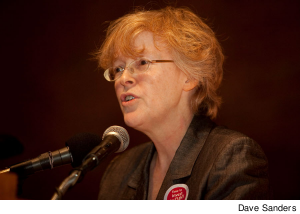 |
The petition, Bowen emphasized, does not simply call for Pathways to be repealed, but also for it to be replaced with a process that respects both faculty governance and the accumulated knowledge of faculty and staff. “One good thing that’s come out of Pathways is a wider recognition of the need to address the facilitation of transfer of credits. We have to address that.” But, Bowen added, “it doesn’t need to be addressed in a way that tramples faculty knowledge and experience, and violates the principles of faculty governance and academic freedom.”
A BETTER ALTERNATIVE
Bowen announced that the PSC lawsuit against Pathways would be filed in a matter of days. The suit, a joint effort with the University Faculty Senate (UFS), was filed on March 20. “I can’t think of a better use of [union] resources than standing up for the academic integrity of a CUNY education,” Bowen remarked.
UFS Chair Sandi Cooper spoke next at the March 8 event, describing how the administration had consistently rejected UFS efforts to work out a different approach. “The UFS proposed at least five different modes of proceeding forward,” said Cooper – including alternatives based on past experience at SUNY and in the California State University system.
At SUNY and CSU, she explained, “small groups of faculty from senior and community colleges, who have the largest transfer rates amongst and between them, [met] in their discipline groups and interdisciplinary groups to come up with an understanding of what range of courses would be acceptable for general education.”
‘NO’ TO LOW EXPECTATIONS
Instead, said Cooper, the top-down process imposed at CUNY “has become a ‘pathway’ for creating struggles between and amongst groups of people” over a scarce number of credits. General education according to the Pathways prescription, she said, “will give students only a vague taste of something outside their majors.”
Terrence Martell, vice chair of the UFS, spoke in personal terms about the decision to go to court. “A lawsuit is not an easy thing,” said Martell. “This is not going to be fun. I don’t look forward to it.” The reason he decided to “put my name, my reputation on this lawsuit,” said Martell, was the damage that Pathways will do to CUNY students, Its watered-down curriculum, he said, represents “the subtle racism of low expectations.”
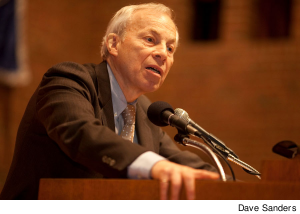 |
“This is a fundamental issue of the kind of society that we are going to live in,” argued Martell. “I do not want our students to have less of an opportunity because of some ill-conceived, poorly thought-through and poorly executed plan. Pathways consigns future generations of CUNY students to a grim future in our globalized, competitive world.”
The new limits on general education will have the biggest impact on the students from the weakest high schools, noted Martell. “They’re the students who need that fourth credit of English that they’re not going to get; they’re the students who need the college algebra course that is reasonably rigorous that they haven’t gotten in high school,” he told the crowd. “I think it’s a fundamental, ultimate educational disaster and I stand against it.”
Jamell Henderson, a student government senator at BMCC who will enroll at Brooklyn College this fall, argued that Pathways sells CUNY students short. “The path to success is difficult, full of obstacles, full of challenges, the toughest terrain and dangerous situations,” Henderson declared. “But it’s how you’ll become victorious, versus a path that has no obstacles, no challenges, no situations that test the ability of the self.”
STUDENT SUPPORT
Many students enter CUNY without enough preparation for college, said Henderson – and like him, many have taken remedial classes to close those gaps. In the face of “violence and crime, police brutality, and economic turmoil,” he said, “it is our eagerness to learn that keeps us strong.” But Pathways, he said, “is something that will hurt us. It will not give us the value of education that we need in order to deal with the real world.”
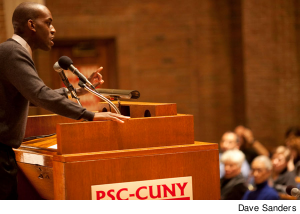 |
Henderson thanked CUNY faculty and staff for demanding a higher-quality alternative to Pathways. “As long as I am a student here in the CUNY system, I will stand alongside you.” Together, Henderson declared, “we will be such an insurmountable force that the chancellery will have to stand and listen.”
Manfred Philipp, professor of chemistry and PSC chapter chair at Lehman, spoke after Henderson. The response to the PSC petition for repeal of Pathways “is a game- changer for this university,” Philipp said. “The chancellery, up till now, has been saying that…the great majority of the faculty are in favor of Pathways and in favor of what it stands for. This petition drive shows that that is not true.”
Saavik Ford, associate professor of astronomy at BMCC, spoke from the perspective of the classroom. “Pathways, with its three-credit, three-hour science requirement, cannot provide anything but a substandard education,” said Ford. Under Pathways, “we are given only three hours with our students” – and that is simply not enough time. Lab sessions “are really a form of supervised practice, [and] the time they take cannot be shortened,” Ford explained. “Nor can we cut regular class hours, which are used to introduce, process and decipher the findings that our students make in the lab.” To stunt the role of lab classes, said Ford, “is to leave our students disenfranchised as citizens of the future.”
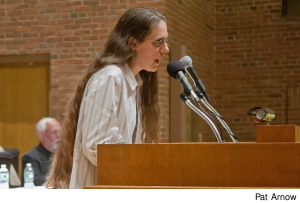 |
During the hour-long open mic, close to 30 people took the floor. It was a chance for CUNY faculty, staff and students to speak with each other about the impact of Pathways, and how to put an alternative in its place. When the meeting adjourned, the large room buzzed with conversation. As faculty, staff and students headed out the door, they picked up hundreds of copies of the petition to take back to their campuses. By Clarion press time, the number of signers had passed 4,100 and was still on the rise.
______________________________
RELATED COVERAGE:
Pathways Under Fire: Calls for a Halt Are Growing
Pathways Petition Takes Off
Union Files Lawsuit Against Pathways
Voices from the Town Hall Meeting

